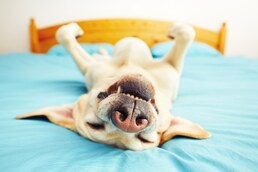 Congrats! You’ve decided to take charge of your pet’s dental health and get their teeth cleaned! Keeping your pet’s teeth and gums clean and healthy can help to prevent periodontal disease and other serious health problems down the road. Here’s what you can expect when your pet gets a dental cleaning. Before the procedure You and your veterinarian will discuss your pet’s medical history and your vet will perform a complete physical exam. They may also take a sample of blood (and possibly urine, too) for a laboratory work-up. Your vet will discuss possible procedures to identify and treat the underlying dental problems including dental cleaning or scaling, periodontal probing, dental x-rays, and others. They will also polish the teeth to provide a pearly white smile! Your veterinarian will give you exact instructions, but you may be asked to withhold food from your pet the evening prior to the procedure to reduce the chance that your pet may vomit during the procedure. The duration of time recommended will vary depending on your pet’s age, pre-existing medical conditions, or any medications they are on. During the procedure Unlike when you go to the dentist, to get the best evaluation and dental care, our pets need to be anesthetized during their dental procedure. Anesthesia is necessary because it allows your pet to be still so your vet can conduct a thorough examination of the whole oral cavity (including below the gumline), take x-rays (to look for “hidden diseases”), and fully and safely clean your pet’s teeth. This also ensures a safe and comfortable experience for your pet by reducing their level of anxiety, stress, and pain. In addition, it protects their airway from any water or debris caused by scaling away the dental plaque that might otherwise find its way down into your pet’s lungs during the procedure. Expect to drop your pet off at the veterinary clinic early to get them settled in and have their pre-anesthesia exam. Your vet may administer “pre-meds” (medications that can help to decrease anxiety, pain, vomiting, and even the amount of other drugs needed to provide general anesthesia). Your veterinarian may also give your dog a medication to prevent vomiting and help them return to eating sooner after the dental procedure is completed. During the dental procedure, your vet will remove plaque and tartar from the teeth and polish them. They will also use a dental probe (like the one your dentist uses on you) to look for pockets of infection around the tooth roots and in the gum. This lets them check the health and stability of the dental ligaments and bony structures beneath the gumline. Dental x-rays may be recommended to fully evaluate the periodontal health of your pet’s mouth and to make sure that no “hidden” disease is present and waiting to flare up (like brewing tooth root infections or resorbed tooth roots). If your veterinarian finds damaged teeth, they may recommend extractions (removing the teeth) or other procedures as necessary. After the procedure After your dog or cat’s dental procedure, your veterinarian or veterinary technician will review everything that was performed during the dental procedure with you. If there is an infection or if your pet has an underlying condition that makes them more susceptible to infection, your vet may give or prescribe an antibiotic. Pain medication may also be provided as there can be some level of inflammation and discomfort following a dental procedure. Your vet may prescribe or send you home with:
An anesthetized dental procedure with your veterinarian is just one step to ensuring a healthy mouth for your pet. Your vet will go over best methods of at- home dental care going forward after the procedure. *This blog post is courtesy of the Zoetis Pet Care, Health and Wellness team. Original Author: Dr. Joyce A. Login*
11 Comments
6/6/2022 12:45:41 pm
This is a very informative—edifying article to all. Thanks a lot! Continue to post!
Reply
7/1/2022 08:29:11 pm
It's interesting that you mentioned that your pet could experience drooling after the surgery. I have a cousin who thinks that her pet has a dental problem because she is not eating properly, and she asked if I had any idea what would be the best option to consider. I wanted to thank you for your explanation, I'll be sure to tell her that she can consult trusted animal hospital as they can answer all her inquiries and will provide the proper treatment.
Reply
8/25/2022 07:25:20 am
I noticed that my dog's teeth have been starting to look brown, so I figure it would be good for me to get him a dental appointment. I'll make sure that I have any documents of his medical history ready.
Reply
11/4/2022 10:27:51 am
Thank you so much for the advice on how to plan and what to expect when our pet is going in for surgery. My cat has to go in for surgery and I've had no idea how to prepare. I want to make sure the pet dentist I go to knows what they're doing so I don't get too nervous.
Reply
12/12/2022 04:42:08 am
I liked it the most when you shared that pets have to be anesthetized during their dental operation. My friend wants to ensure that his pet's teeth are healthy. I think it's time to see a pet dentist for proper care.
Reply
2/21/2023 06:23:36 pm
It helped when you said that one of the most important things is to anesthetize your pet for a safe dental procedure. My sister told me her pet has a dental problem because she was not eating properly since the other day. She asked if I had thoughts on the safe option treatment to consider. I appreciate this article for explaining the importance of clinic consultation. I'll tell her she can consult a trusted emergency veterinary clinic as they can provide accurate checkups for her pet.
Reply
I like that you talked about dental X-rays for our pets to fully identify any issues that can be present in their mouth and find hidden diseases as well that are just starting out. I will make sure that I will look for a vet that I can trust to get that kind of service for my dog, because I noticed that there are some black parts in his teeth. And I hope we are not too late to get them removed and treated, because we just got too busy these past few months to check those parts of his body.
Reply
7/25/2023 09:43:01 pm
It really helped when you said that the veterinarians will provide the instructions when it comes to the requirements needed before a certain procedure is done, especially to avoid vomiting. I will keep that in mind when I take my dog to an animal hospital every year for a checkup. There might come a day when it would need some treatment that will include surgery, so I have to be prepared for the betterment of my pet as it gets older.
Reply
Leave a Reply. |
Author
Our technicians and doctors write posts for this blog, hoping to keep our clients informed and entertained. We hope you find their topics helpful and fun to read about! Archives
December 2019
Categories |

 RSS Feed
RSS Feed



